Last weekend on our walk around the New Forest, Pete commented as we were walking through a boggy forest that it looked like a perfect example of a dell. I was completely taken aback, as this was not my idea of a dell. Since both of us are geographers, we walk around fairly confident in general that we understand the landscapes around us. So when I asked what his description of a dell was, he said it was most any landscape in Britain that is partially flooded.
I, on the other hand, imagine something closer to a Swiss alps scene with mostly green grass in a open, hollowed out bowl-shaped hilly area. I imagine some cows in the field, pretty flowers and bushes or small trees around the edges. To be perfectly honest I had never properly learned the term dell nor had given the word ‘dell’ much thought at all. Once I did think about it, apparently I had developed a very colourful sense of what it must be.
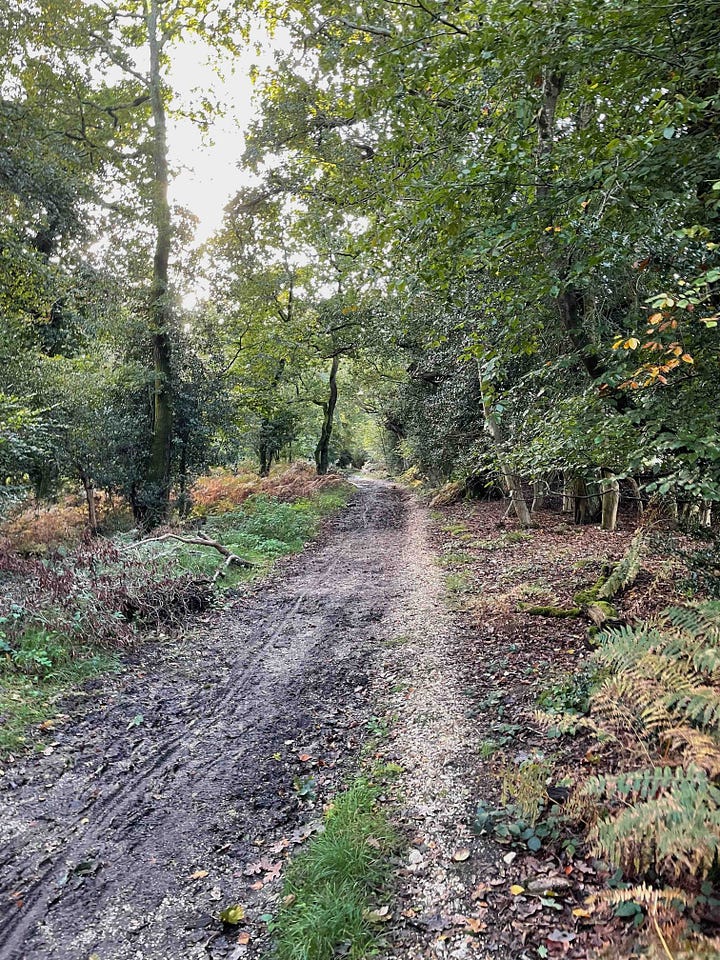

My version must have come from nursery rhymes or picture books that were illustrated in ways that drove my imagination. Heidi? The farmer in the dell? Coastal Northern California wasn’t particularly rich in dell habitat, as far as I imagined them to be, so I’m not sure where I got my ideas of what dells should look like except from early books and pictures.
Of course once we got home I looked it up. According to the Cambridge Dictionary, Dell is a small valley, usually with trees1
The following is from wikipedia2:
In physical geography, a dell is a grassy hollow—or dried stream bed—often partially covered in trees. In literature, dells have pastoral connotations, frequently imagined as secluded and pleasant safe havens.
The word "dell" comes from the Old English word dell, which is related to the Old English word dæl, modern 'dale'.
Dells in literature. The term is sometimes used interchangeably with dingle, although this specifically refers to deep ravines or hollows that are embowered with trees.
Neither of us seemed to get it quite right as it turns out. But who isn’t slightly thrilled with the words ‘dingle’ and ‘embowered’!?!
As I mulled this over, I thought about some other words that have confounded my understanding now and again living here. There are many words and expressions which have different meanings in the US and the UK, and I have tried to learn the differences. I’ve written previously about my struggles with the ‘same but different’ language in my early days living in the UK.
Two countries, a common language?
You may have heard the saying attributed to George Bernard Shaw that “England and America are two countries separated by the same language”. I have been trying to bridge the subtle and not-so-subtle separation for the last dozen years living and working here in the UK.
The words and phrases I have particular difficulty with are the words that mean exactly the OPPOSITE of each other.
WHY IS THAT?
Here are a few examples:
Inside lane:
This means exactly the opposite in the US to the UK, and has been the cause of numerous ‘heated discussions’ as we used to drive up the A-38 motorway/highway leaving Plymouth. Eventually I looked up the meaning and lo and behold, according to the Cambridge Dictionary3:
inside lane noun [C] (ROAD):
UK: the part of the road nearest the edge, used especially by slower vehicles (Sabrina note: for my US readers, remember the slow lane is the left edge, since UK vehicles drive on the left side, opposite to the US)
US: the part of the road nearest the vehicles going in the opposite direction (Sabrina note: since US vehicles drive on the right, this refers to the FASTER lane, which is the left lane)
Did they develop the opposite meaning because inside lane always refers to the left lane, rather than the faster or slower lane? Another intriguing point is that when the word refers to a track (like a racing track), this is the definition:
inside lane noun [C] (RACE):
the part of a racetrack nearest the middle
The lane nearest the middle of a track is usually the fastest lane, and also, as races tend to be run anti- or counter-clockwise, that would make the inside lane usually the one on the left-hand side.
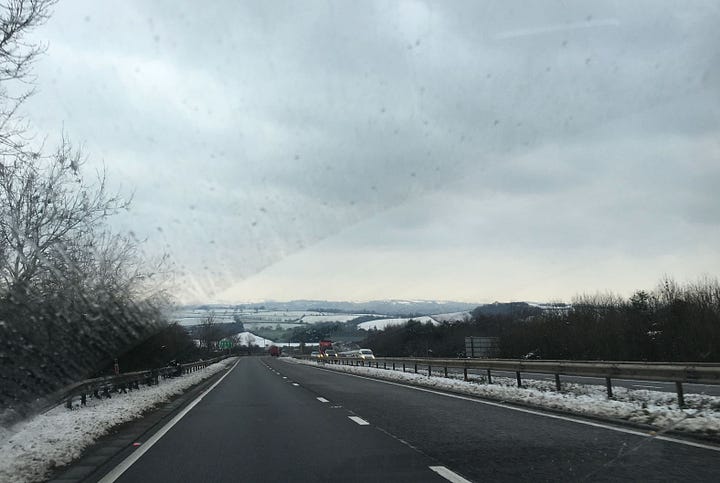
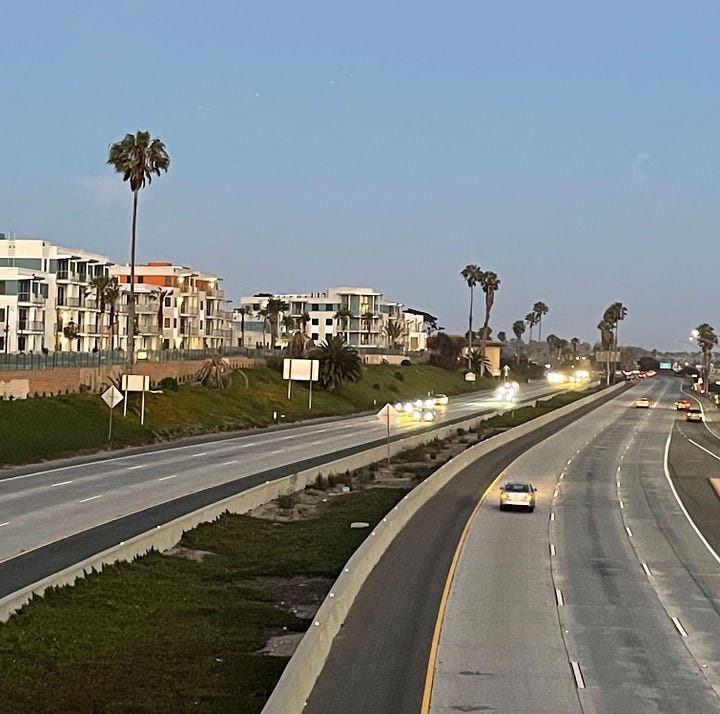
It all makes sense now, right? 🤦🏽♀️
Homely:
This word is yet another example of opposites. In the US, the word is used in a not complimentary, slightly disparaging way:
Not attractive or good-looking. "a homely child." Lacking elegance or refinement. "homely furniture."4
In the UK, however, it is used in a more positive sense, meaning cozy, welcoming or ‘homey’ in the US sense:
plain or ordinary, but pleasant: The hotel was homely and comfortable5
Table
For this example I am talking about ‘table a meeting’. In the US, when someone says ‘we should table this’, it means we should postpone discussing it until later. In the UK, however, to ‘table’ something means to put it on the agenda to start discussions now. In other words, each has the opposite meaning to the other.6
Nervy
If you are nervy in the UK, then you are nervous or anxious about something or a situation. If you are nervy in the US, you are full of confidence and are feeling bold and brave. You plan to go for it, despite the risks.
Ground Floor versus First Floor
These are not opposites but a completely different way of counting. In the UK and Europe, if your room is on the first floor, you will need to go up one floor from your entrance on the Ground Floor. In America, the first floor is the ground floor.

Other interesting turns of phrase
In the UK, country names have been added on the front of expressions that are absent, or completely differently named in the US. Why is that?
Chinese whispers/Telephone (game)
In both the UK and the US, and indeed all over the world, the game of whispering a phrase from one person to the next and seeing how the phrase changes after being passed around a group is played from childhood on up. In the UK, one explanation is given that the game used to be called Russian whispers, but eventually was changed to Chinese whispers, in both cases referring to an unintelligible language7. In the US, it has always just been called Telephone, or sometimes Gossip.
Mexican wave/Wave
In the UK, it is pretty universally believed that the Mexican Wave was invented at the 1986 FIFA Wold Cup (Football/Soccer) in Mexico. According to wikipedia8, it was actually invented in 1979 at a US National Hockey League game in Denver, Colorado. It was only seen a couple of other times after that until 1981, when at a University of Washington vs. Stanford University football game in Seattle, Washington in autumn 1981, a wave was created. From then on it was seen intermittently but consistently at sports events throughout the US. It’s first international broadcast appearance was at an Olympic Football (soccer) match between Brazil and France in 1984, played at the Rose Bowl in Pasadena California.
Red sky at night, sailors/shepherds delight; red sky at morning, sailors/shepherds take warning.
Such a lovely saying! Once again, I was startled to hear the word ‘shepherds’ being used, because I grew up hearing ‘sailors’. Back to wikipedia I went, and again, no idea why we have different ‘sky watchers’, when both claim to be derived from the new testament9. In Matthew 16:2b–3, Jesus says:
When it is evening, you say, "It will be fair weather; for the sky is red."
And in the morning, "It will be stormy today, for the sky is red and threatening”
Note: no mention of sailors or shepherds. Which one did you grow up hearing?
How about you? Do you have phrases that surprised you when you heard someone else interpreted them differently? Have you had some of your childhood ideas completely upended when you got older? How does that make you feel? Let me know in the comments!
Thank you so much for reading each week and especially for those of you who comment. ❤️ I LOVE to hear your thoughts and ideas! Until next time!
xx Sabrina
If you liked reading this, feel free to click the ❤️ button on this post so more people can discover it on Substack 🙏
https://dictionary.cambridge.org/dictionary/english/dell
https://en.wikipedia.org/wiki/Dell_(landform)
https://dictionary.cambridge.org/dictionary/english/inside-lane
The American Heritage® Dictionary of the English Language, 5th Edition.
https://dictionary.cambridge.org/dictionary/english/homely
The examples of Table, Nervy and Ground Floor vs First Floor were inspired by https://www.learning-mind.com/british-english-vs-american-english-words/
https://www.phrases.org.uk/meanings/chinese-whispers.html; https://en.wikipedia.org/wiki/Chinese_whispers
https://en.wikipedia.org/wiki/Wave_(audience)
https://en.wikipedia.org/wiki/Red_sky_at_morning

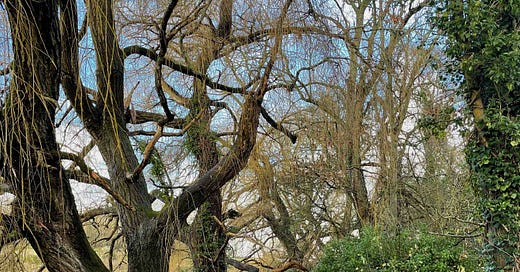



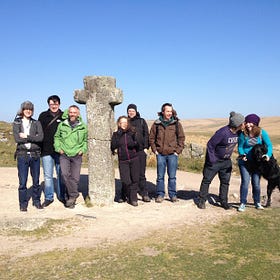

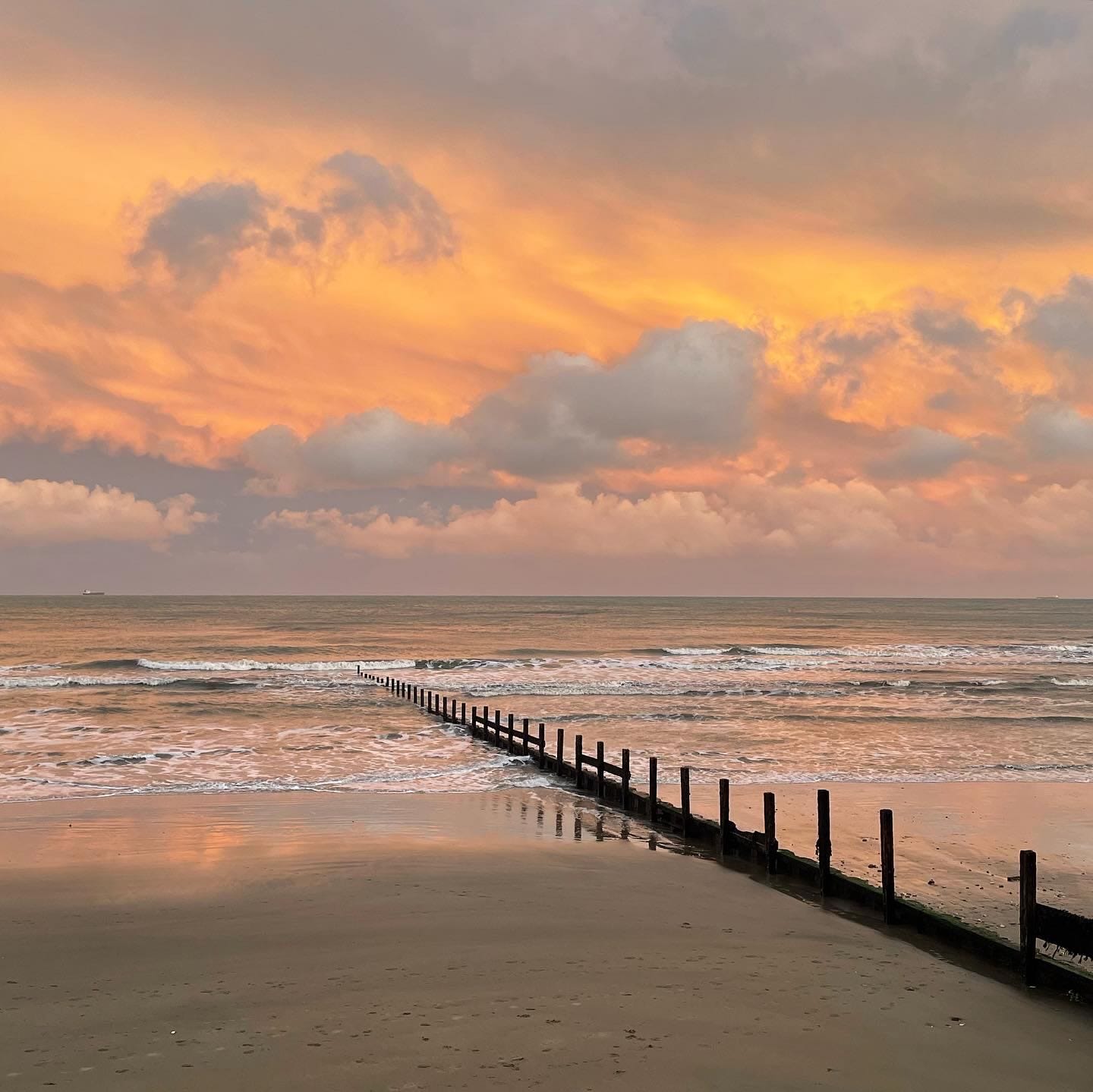
Such a fascinating post, Sabrina!
In my efforts to train up in the art of not getting lost I've done a couple of day courses with a navigation coach, and last time we had a great time discussing how we could anticipate how the landscape would look as we walked through it simply by paying attention to the names of places and features on the map - suffixes such as '-shaw', '-hurst', '-down', '-bourne' and many, many others. It's almost another language! Depending on the suffix of a place name we'd know to look for a line of trees, or a river, or a ridge. https://en.wikipedia.org/wiki/List_of_generic_forms_in_place_names_in_the_British_Isles
Your comparison of 'homely' in US English and British English really made me laugh. On an early visit by my parents to my brother and SIL's new house, my sister-in-law (from the US) was horrorstruck when my mum told her 'Oh, it's so homely!' 🫢 Over here, of course, that's a really nice thing to say! 🤣
The difference in language from English speakers is vast, isn't it? In each case you gave, I've grown up with the UK interpretation. but it stands to reason as Australia clung to its Mother Country well after independence and Federation. The monarchy is still 'our' monarchy, although that may change sooner rather than later. But in the meantime, my age-group are more anglo than Americanised.
The shepherd/sailor case is an odd one though. My family have always been sea folk, so I grew up with 'sailor' but my husband, who is a 4th generation farmer, uses 'shepherd'. I'll be interested to see what our little 6th generation shepherd/sailor grandson uses.